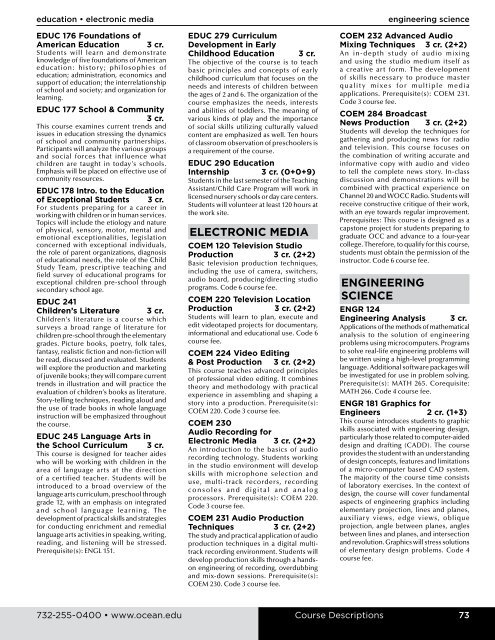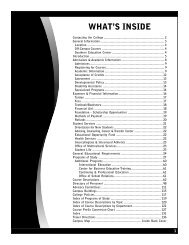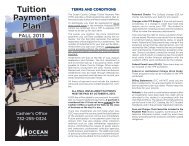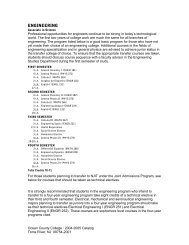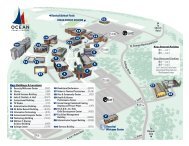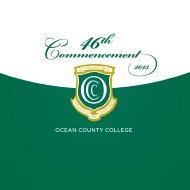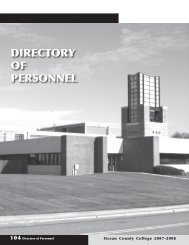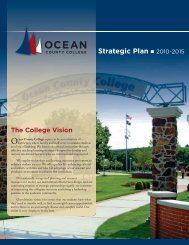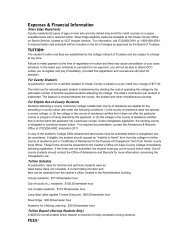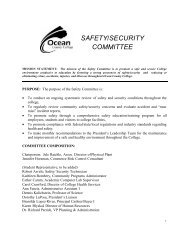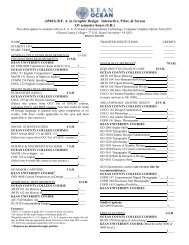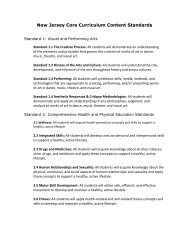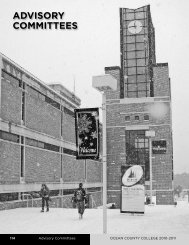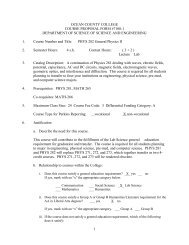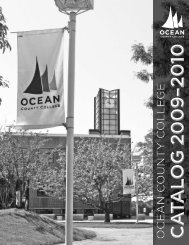current college catalog. - Ocean County College
current college catalog. - Ocean County College
current college catalog. - Ocean County College
You also want an ePaper? Increase the reach of your titles
YUMPU automatically turns print PDFs into web optimized ePapers that Google loves.
education • electronic media<br />
EDUC 176 Foundations of<br />
American Education 3 cr.<br />
Students will learn and demonstrate<br />
knowledge of five foundations of American<br />
education: history; philosophies of<br />
education; administration, economics and<br />
support of education; the interrelationship<br />
of school and society; and organization for<br />
learning.<br />
EDUC 177 School & Community<br />
3 cr.<br />
This course examines <strong>current</strong> trends and<br />
issues in education stressing the dynamics<br />
of school and community partnerships.<br />
Participants will analyze the various groups<br />
and social forces that influence what<br />
children are taught in today’s schools.<br />
Emphasis will be placed on effective use of<br />
community resources.<br />
EDUC 178 Intro. to the Education<br />
of Exceptional Students 3 cr.<br />
For students preparing for a career in<br />
working with children or in human services.<br />
Topics will include the etiology and nature<br />
of physical, sensory, motor, mental and<br />
emotional exceptionalities, legislation<br />
concerned with exceptional individuals,<br />
the role of parent organizations, diagnosis<br />
of educational needs, the role of the Child<br />
Study Team, prescriptive teaching and<br />
field survey of educational programs for<br />
exceptional children pre-school through<br />
secondary school age.<br />
EDUC 241<br />
Children’s Literature 3 cr.<br />
Children’s literature is a course which<br />
surveys a broad range of literature for<br />
children pre-school through the elementary<br />
grades. Picture books, poetry, folk tales,<br />
fantasy, realistic fiction and non-fiction will<br />
be read, discussed and evaluated. Students<br />
will explore the production and marketing<br />
of juvenile books; they will compare <strong>current</strong><br />
trends in illustration and will practice the<br />
evaluation of children’s books as literature.<br />
Story-telling techniques, reading aloud and<br />
the use of trade books in whole language<br />
instruction will be emphasized throughout<br />
the course.<br />
EDUC 245 Language Arts in<br />
the School Curriculum 3 cr.<br />
This course is designed for teacher aides<br />
who will be working with children in the<br />
area of language arts at the direction<br />
of a certified teacher. Students will be<br />
introduced to a broad overview of the<br />
language arts curriculum, preschool through<br />
grade 12, with an emphasis on integrated<br />
and school language learning. The<br />
development of practical skills and strategies<br />
for conducting enrichment and remedial<br />
language arts activities in speaking, writing,<br />
reading, and listening will be stressed.<br />
Prerequisite(s): ENGL 151.<br />
EDUC 279 Curriculum<br />
Development in Early<br />
Childhood Education 3 cr.<br />
The objective of the course is to teach<br />
basic principles and concepts of early<br />
childhood curriculum that focuses on the<br />
needs and interests of children between<br />
the ages of 2 and 6. The organization of the<br />
course emphasizes the needs, interests<br />
and abilities of toddlers. The meaning of<br />
various kinds of play and the importance<br />
of social skills utilizing culturally valued<br />
content are emphasized as well. Ten hours<br />
of classroom observation of preschoolers is<br />
a requirement of the course.<br />
EDUC 290 Education<br />
Internship 3 cr. (0+0+9)<br />
Students in the last semester of the Teaching<br />
Assistant/Child Care Program will work in<br />
licensed nursery schools or day care centers.<br />
Students will volunteer at least 120 hours at<br />
the work site.<br />
electronic media<br />
COEM 120 Television Studio<br />
Production 3 cr. (2+2)<br />
Basic television production techniques,<br />
including the use of camera, switchers,<br />
audio board, producing/directing studio<br />
programs. Code 6 course fee.<br />
COEM 220 Television Location<br />
Production 3 cr. (2+2)<br />
Students will learn to plan, execute and<br />
edit videotaped projects for documentary,<br />
informational and educational use. Code 6<br />
course fee.<br />
COEM 224 Video Editing<br />
& Post Production 3 cr. (2+2)<br />
This course teaches advanced principles<br />
of professional video editing. It combines<br />
theory and methodology with practical<br />
experience in assembling and shaping a<br />
story into a production. Prerequisite(s):<br />
COEM 220. Code 3 course fee.<br />
COEM 230<br />
Audio Recording for<br />
Electronic Media 3 cr. (2+2)<br />
An introduction to the basics of audio<br />
recording technology. Students working<br />
in the studio environment will develop<br />
skills with microphone selection and<br />
use, multi-track recorders, recording<br />
consoles and digital and analog<br />
processors. Prerequisite(s): COEM 220.<br />
Code 3 course fee.<br />
COEM 231 Audio Production<br />
Techniques 3 cr. (2+2)<br />
The study and practical application of audio<br />
production techniques in a digital multitrack<br />
recording environment. Students will<br />
develop production skills through a handson<br />
engineering of recording, overdubbing<br />
and mix-down sessions. Prerequisite(s):<br />
COEM 230. Code 3 course fee.<br />
COEM 232 Advanced Audio<br />
Mixing Techniques 3 cr. (2+2)<br />
An in-depth study of audio mixing<br />
and using the studio medium itself as<br />
a creative art form. The development<br />
of skills necessary to produce master<br />
quality mixes for multiple media<br />
applications. Prerequisite(s): COEM 231.<br />
Code 3 course fee.<br />
COEM 284 Broadcast<br />
News Production 3 cr. (2+2)<br />
Students will develop the techniques for<br />
gathering and producing news for radio<br />
and television. This course focuses on<br />
the combination of writing accurate and<br />
informative copy with audio and video<br />
to tell the complete news story. In-class<br />
discussion and demonstrations will be<br />
combined with practical experience on<br />
Channel 20 and WOCC Radio. Students will<br />
receive constructive critique of their work,<br />
with an eye towards regular improvement.<br />
Prerequisites: This course is designed as a<br />
capstone project for students preparing to<br />
graduate OCC and advance to a four-year<br />
<strong>college</strong>. Therefore, to qualify for this course,<br />
students must obtain the permission of the<br />
instructor. Code 6 course fee.<br />
Engineering<br />
science<br />
engineering science<br />
ENGR 124<br />
Engineering Analysis 3 cr.<br />
Applications of the methods of mathematical<br />
analysis to the solution of engineering<br />
problems using microcomputers. Programs<br />
to solve real-life engineering problems will<br />
be written using a high-level programming<br />
language. Additional software packages will<br />
be investigated for use in problem solving.<br />
Prerequisite(s): MATH 265. Corequisite:<br />
MATH 266. Code 4 course fee.<br />
ENGR 181 Graphics for<br />
Engineers 2 cr. (1+3)<br />
This course introduces students to graphic<br />
skills associated with engineering design,<br />
particularly those related to computer-aided<br />
design and drafting (CADD). The course<br />
provides the student with an understanding<br />
of design concepts, features and limitations<br />
of a micro-computer based CAD system.<br />
The majority of the course time consists<br />
of laboratory exercises. In the context of<br />
design, the course will cover fundamental<br />
aspects of engineering graphics including<br />
elementary projection, lines and planes,<br />
auxiliary views, edge views, oblique<br />
projection, angle between planes, angles<br />
between lines and planes, and intersection<br />
and revolution. Graphics will stress solutions<br />
of elementary design problems. Code 4<br />
course fee.<br />
732-255-0400 • www.ocean.edu Course Descriptions<br />
73


